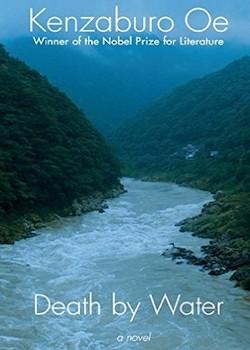Death by Water

By Oe Kenzaburo
Atlantic Books (2015)
ISBN-10: 0857895451
Review by Charlotte Goff
In a small, forest-shrouded settlement in rural Shikoku, it is conventional wisdom that as a person dies, he or she goes “up into the forest.” Returning to this, his childhood home, is Kenzaburo Oe’s protagonist and recurring literary alter-ego, celebrated author Choko Kogito. In Death by Water, translated into English by Deborah Boliver Boehm, Choko both revisits his past and contemplates his own approaching path into the forest.
For the past six decades Choko has been haunted by memories of the untimely death of his father and the uncomfortable question: could his childhood-self have done something to prevent it? Choko plans to fictionalise the episode, which saw his father set off in a small boat during a torrential storm, to produce a masterpiece: a “drowning novel” that will redefine his canon and bring closure to the doubts which have chased him across the years.
Unable to reconcile memories of his adored late father with hazy half-recollections of things overheard but not understood – his father’s meetings with local soldiers and alcohol-infused schemes against the Emperor – Choko is convinced that the key to his father’s doomed voyage lies in the red, leather trunk that his mother has refused to surrender until now. Rather than providing illumination, however, the trunk’s contents render the surface still more opaque Choko becomes an author who cannot write and so he lends his creative power to the avant-garde theatre troupe that take residence at his ‘Forest House’.
Choko is not the only one facing up to past experiences; Unaiko, a dynamic young member of the troupe, uses theatre to confront her own traumas. Her unique brand of performance art incorporates audience participation, debate and ‘dog-tossing’. The pelting of stuffed-toy dogs as a new and subversive theatre form as well as its nomenclature loses none of its surrealism as the book progresses.
Oe received the 1994 Nobel Prize in Literature for creating “with poetic force… an imagined world, where life and myth condense to form a disconcerting picture of the human predicament today”. In Death by Water, what begins as the struggle of one author slowly unfurls into a drama concerning his family, the troupe of young actors, a small settlement in Shikoku and eventually Japanese society as a whole. It is the human predicament, again, that proves to be at the heart of this novel.
How do we define the spirit of an age and do we, simply by virtue of living in that age, belong to it? How do we come to understand and process traumas in our past? These questions resonate in the latter half of the book, and the answer to the second is a resounding ‘through art.’ Oe reminds us that beliefs, relationships and memories built over decades can be fractured through the utterance of a single word, as we see first-hand in the disintegration of the relationship between Choko and – in another self-referential nod – his disabled son, Akari. Reading this, one is reminded that it is our perception of events that shapes our reactions and future courses whilst what ‘actually happened’ rarely comes into it; much of what Choko learns about his father comes not from red leather trunks but memories revisited and reassessed.
Through Choko Kogito we see, or think we see, something of Oe. Strip away the surrounding characters and you are left with the story of an acclaimed author who the younger generation increasingly find irrelevant and who, looking back on a literary career now in its late stages, wonders whether he could have done differently, or better?
In one scene, a dog-tossing dramatic performance of Natsume Soseki’s Kokoro, an audience member stands up and references Choko’s recent bouts of vertigo. These are, he says, “completely understandable, since whenever we try to read his [Choko’s] convoluted sentences I think we all start to feel a bit dizzy, too”. Reading this, I nod. There is a limit to my patience, which comes close to being reached during pages of confused memories, stilted correspondence and swathes of reported speech. In this beautifully reflective and thought-provoking tale, which progresses for the most part at an almost imperceptible, meandering pace, I found that I wished for a stronger current.

